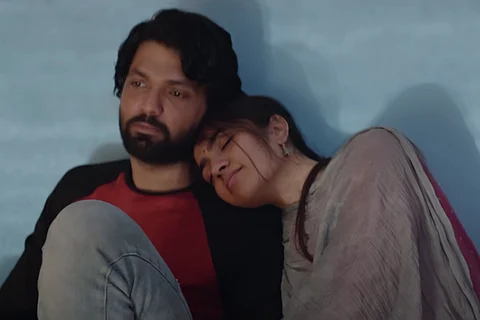

In Hemanth M Rao's Sapta Sagaradaache Ello (Side A), more than the spoken word, it's the metaphors and fierce juxtapositions that do all the talking. It starts with the title which refers to a Rumi-esque mystical place beyond the seven seas, where forlorn lovers can meet. But interestingly, the film is set nowhere near the sea, but in the thick of urban chaos where lovers battle to bring their modest dreams to life.
Manu (Rakshit Shetty) and Priya (Rukmini Vasanth), the said lovers, picture a life together that's away from the hustle and smile at the prospects of that daydream. The irony, though, is that in every real attempt they make towards realising it, they inch further and further away from it. Hemanth Rao's film, when looked at from afar, will seem like any run-of-the-mill story about an ill-fated couple, but the essence of the film is felt (the operative word here) when you invest yourself completely in it. Sapta Sagaradaache Ello lies entirely in those tiny, touching moments that play out between Manu, Priya, and their gruelling strife to find a small piece of that elusive paradise.
That being said, the film is not devoid of cliches. Both Manu and Priya are mad about each other, but their love is extremely tender and even corny at times. She calls him 'Katthe' (a term of endearment that literally means a donkey or an ass!) and he refers to her as Putti. We catch their intimacy, the quirks of their relationship, as bystanders and that's because Hemanth does a great job of dropping us straight into the action, making no fuss about "introducing" the superstar leading man. We do see ‘The’ Rakshit Shetty on screen, but the actor does a good job of slipping into the character, though there are times you would think he could have done better. Regardless, it is apparent that Hemanth is concerned only about his two protagonists and he submits all his energy and focus to them. For a while in the film, no other characters except Manu and Priya seem even remotely important to us.
But that, of course, also turns out to be a nice strategic ploy on the director's part because once the other "players" enter the fray, we suddenly grow protective of the two. It would be no spoiler, I'm guessing, in revealing that something very momentous occurs in the film and Manu is separated from Priya. How and why that happens is not exactly inventive or out of the box, as it were, but it is effective nevertheless because that sudden shift in gear takes the film to a desired checkpoint with a screeching halt. And it's after this that Hemanth M Rao shines the brightest.
Again, what really happens at this juncture in terms of story or plot is important, but it's best experienced within a context. Let's just say that those who have watched the trailer will know that the element of prison is important to the story, and a lot of drama now unfolds inside this setting. There are cliches here, too, about the horrors of jail time, the way it also serves as a place of redemption and all that, but they are largely interesting because the focus still remains on Manu and Priya's love story.
One of the main charms of a Hemanth M Rao film is Charan Raj's music and the composer brings his best to the table, enunciating everything unspoken in the film with his score. Hemanth and Charan are in perfect synchrony here and together, they are able to lend a kind of vignettic tone to the film. Very little comes across as contrived or overdone in these portions and you start to feel that the film required to be bookended with this level of nuance.
The climax of the film, in particular, needed better agency on the writers' part. A terrific bit of irony starts to emerge in the moments leading up to the climax wherein one person starts to use the confinement of a prison for self-discovery, whereas the one "stuck" outside starts to feel suffocated. How great would it be, I thought, had Hemanth Rao and his co-writer Gundu Shetty extrapolated this angle and taken the story to an unimaginable place? Sure, that is wishful thinking, but I also felt the route they took wasn't all that refreshing either. There's Side B or the second part of Sapta Sagaradaache Ello to take the story forward, but at this point, you do feel like you can predict what's to come.
Performances-wise, both Rukmini Vasanth and Rakshit Shetty are superb when together and it is apparent that Hemanth Rao trusts them immensely as actors. There's some kind of shorthand that the two have for one another and it is mostly visible in those melancholic glances they share.
Sapta Sagaradaache Ello (Side A), as an experience, is incredibly engaging because it has the rare capacity to draw you into its world, specifically at its own pace. One might find the film being pulled up by other critics and audiences for its pacing, but for those who really like to see things unfurl on their own accord, this works. It may have a few "oh, I have seen this before" moments scattered all over, but as pointed out already, the film leaves a lasting impression. And tell me which was the last theatrical outing did that to you?
Disclaimer: This review was not paid for or commissioned by anyone associated with the film. Neither TNM nor any of its reviewers have any sort of business relationship with the producers or any other members of its cast and crew.